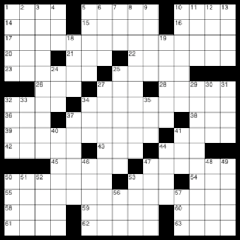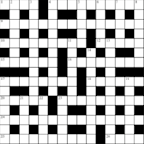Ad
related to: distractible raycon code word crossword- Amazon Home
Shop New Trends & Arrivals.
Discover Your Style with Amazon!
- Shop Echo & Alexa Devices
Play music, get news, control your
smart home & more using your voice.
- Meet Rivet
Shop Modern Furniture & Home Décor.
Find Best Sellers only on Amazon.
- Shop with Points
Use your Credit Card Reward Points.
Use Points for What You Want Today!
- Amazon Home
Search results
Results From The WOW.Com Content Network
On 18 August 1942, a day before the Dieppe raid, 'Dieppe' appeared as an answer in The Daily Telegraph crossword (set on 17 August 1942) (clued "French port"), causing a security alarm. The War Office suspected that the crossword had been used to pass intelligence to the enemy and called upon Lord Tweedsmuir, then a senior intelligence officer ...
A code word is a word or a phrase designed to convey a predetermined meaning to an audience who know the phrase, while remaining inconspicuous to the uninitiated. For example, a public address system may be used to make an announcement asking for "Inspector Sands" to attend a particular area, which staff will recognise as a code word for a fire or bomb threat, and the general public will ignore.
Android. Release. February 15, 1942; 82 years ago. ( 1942-02-15) Genre (s) Word game. Mode (s) Single-player. The New York Times Crossword (marketed as The Crossword) is a daily American-style crossword puzzle published in The New York Times as part of The New York Times Games, online on the newspaper's website, syndicated to more than 300 ...
Markiplier (real name: Mark Fischbach) hosts “Distractible” with two of his longtime friends: Wade Barnes (whom “I think I’ve known since the sixth grade,” Fischbach says) and Bob ...
Roman numerals: for example the word "six" in the clue might be used to indicate the letters VI; The name of a chemical element may be used to signify its symbol; e.g., W for tungsten; The days of the week; e.g., TH for Thursday; Country codes; e.g., "Switzerland" can indicate the letters CH; ICAO spelling alphabet: where Mike signifies M and ...
The solver is given a grid and a list of words. To solve the puzzle correctly, the solver must find a solution that fits all of the available words into the grid. Generally, these words are listed by number of letters, and further alphabetically. Many times, one word is filled in for the solver to help him or her begin the game.
Acrostic (puzzle) An acrostic is a type of word puzzle, related somewhat to crossword puzzles, that uses an acrostic form. It typically consists of two parts. The first part is a set of lettered clues, each of which has numbered blanks representing the letters of the answer. The second part is a long series of numbered blanks and spaces ...
A telegraph code is one of the character encodings used to transmit information by telegraphy. Morse code is the best-known such code. Telegraphy usually refers to the electrical telegraph, but telegraph systems using the optical telegraph were in use before that. A code consists of a number of code points, each corresponding to a letter of the ...
Code word (figure of speech), designed to convey a predetermined meaning to a receptive audience, while remaining inconspicuous to others. Procedure word, in voice communication. Code word, an element of a codebook designed so that the meaning of the code word is opaque without the code book. Code name, a clandestine name or cryptonym used to ...
Commercial code (communications) In telecommunication, a commercial code is a code once used to save on cablegram costs. [1] Telegraph (and telex) charged per word sent, so companies which sent large volumes of telegrams developed codes to save money on tolls. Elaborate commercial codes which encoded complete phrases into single words were ...








